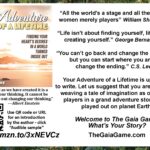[et_pb_section fb_built=”1″ _builder_version=”4.8.1″ _module_preset=”default”][et_pb_row _builder_version=”4.8.1″ _module_preset=”default”][et_pb_column _builder_version=”4.8.1″ _module_preset=”default” type=”4_4″][et_pb_text _builder_version=”4.8.1″ _module_preset=”default” link_option_url=”https://youtu.be/n2W8dKdgGhc” link_option_url_new_window=”on” hover_enabled=”0″ sticky_enabled=”0″]
Can we break the cycle? If we can begin to take society wide action now, we do have time to protect our well-being in the years ahead. We also know how to mitigate the threats facing all living things on the planet. We do not need to repeat history if we can learn from past mistakes. Our advances in science and technology have provided the tools and knowledge needed restore the balance in Nature that is vital to the well-being of all living things. Repeating past mistakes will produce a future where we do not survive. It is vital that people know the current reality because it is only through lack of action that our way of life will be doomed.
Our primary challenge is cultural. We have been living for some time in the age of the individual. Our survival likely rests on our ability to establish a new age of community. Can we come together for our shared well-being and restore the balance in Nature?
No man is an island,
Entire of itself,
Every man is a piece of the continent,
A part of the main.
If a clod be washed away by the sea,
Europe is the less.
As well as if a promontory were.
As well as if a manor of thy friend’s
Or of thine own were:
Any man’s death diminishes me,
Because I am involved in mankind,
And therefore never send to know for whom the bell tolls;
It tolls for thee.
Here’s where things stand:
- Average soil loss per acre of farmland in the US is 4 Tons
- Average annual worldwide farmable land lost to degradation is 30 million acres
- 75% of land worldwide is already degraded
- ⅓ of farmable land has been lost to degradation in the past 40 years
- Over 20 major civilizations have collapsed due to soil loss
An Albert Einstein’s quote that is often repeated usually leaves out the second half of his statement which helps us understand why we so often continue making the same mistakes over and over again.
“If doing the same thing over and over and expecting a different result is a definition of insanity, expecting people whom we overwhelmingly rewarded for acting in one manner to change that behavior is more than a bit naïve, as any parent knows or finds out quickly.”
Progress and overall prosperity along with quality of life for the most substantial number of people ever before on the planet, has continuously developed at an accelerating pace for several centuries now. It is no wonder that many would choose to believe our technology can save us from any challenge through our great ingenuity. However, while continuing advances in technology can help us, there is a fatal flaw in the foundation of our civilization. The health of the very ground our grand societies are built on is being destroyed. It would be one thing if as a species we had never seen this movie before but this same tale has played out many times and brought down the most powerful cultures we have created on this planet.
Another quote that is often repeated is,
“Those that fail to learn from history, are doomed to repeat it.”
Winston Churchill
To take a look at what history has to teach us there is a fascinating and rather scary report done nearly 100 years ago that predicts a dire future for all of us unless we can learn from the mistakes of our past. “Conquest of the Land through 7,000 Years” is Dr. W.C. Lowdermilk’s (formerly Assistant Chief, Soil Conservation Service) personal report of a study he made in 1938 and 1939. He discovered that soil erosion, deforestation, overgrazing, neglect, and conflict between cultivators and herdsman have helped topple empires and wipe out entire civilizations, not once but repeatedly.
So shall we learn from history or shall we accept our doom?
Don’t feel hopeless, we happen to know the solutions required. The question is will we come together to save the world? For a look at the problem and some solutions, watch…
SCAN TO WATCH VIDEO (https://youtu.be/n2W8dKdgGhc)
[/et_pb_text][/et_pb_column][/et_pb_row][/et_pb_section][et_pb_section fb_built=”1″ _builder_version=”4.8.1″ _module_preset=”default”][et_pb_row _builder_version=”4.8.1″ _module_preset=”default”][et_pb_column _builder_version=”4.8.1″ _module_preset=”default” type=”4_4″][et_pb_video src=”https://youtu.be/n2W8dKdgGhc” _builder_version=”4.8.1″ _module_preset=”default” border_radii=”on|14px|14px|14px|14px” hover_enabled=”0″ sticky_enabled=”0″][/et_pb_video][/et_pb_column][/et_pb_row][/et_pb_section]








